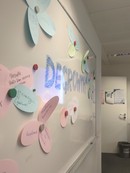Growing Your Understanding of Degrowth: A Workshop with Anitra Nelson
A Report on the Recent Degrowth Group Workshop
13.06.2025
In preparation of publishing the Routledge Handbook of Degrowth, acclaimed activist-scholar and former Carson Fellow Anitra Nelson went on a tour to give talks and workshops on the degrowth concept and movement and made a stop at the RCC. On 6 June 2025, Anitra held an interactive workshop for those interested in—or wanting to learn more about—degrowth and its expansion as an academic concept and movement. The workshop was designed to examine participants’ conceptions of degrowth and, based on insights from the Anitra’s book, develop a deeper understanding of its relevance to the field of the environmental humanities and beyond. The workshop was organized by ProEnviron doctoral candidate Sevgi Mutlu Sirakova and visiting doctoral candidate Christiane Heisse; the latter moderated the workshop.
After a brief introduction of Anitra Nelson, the workshop started with a short brainstorming session on what the participants already knew or associated with degrowth. On the whiteboard, the group collected keywords and phrases, such as “when is enough enough?,” “decolonize growth paradigm,” “use what we have,” “planetary boundaries,” “sufficiency,” “slowness,” “reduce inequality,” “return to basics,” “downscaling,” and “systemic change,” among various other contributions.
Then, Anitra Nelson brought these individual discussions and ideas together and started presenting the Routledge Handbook of Degrowth. She gave a detailed overview of the structure of the book, explained why they selected specific thematic categories, and outlined the challenges that arose when choosing one topic over another. The handbook begins with a discussion of the current growth conjuncture and moves on to a historical and developmental illustration of the origins of degrowth. It then outlines degrowth practices and degrowth in action, before it concludes, in the final section, commenting on the concept’s outlook and perspectives and strategies for the future. During her talk, she highlighted graphs and statistics that illustrate the topics she addressed particularly well.
Having introduced her work, Anitra invited participants to a round of questions and a discussion, which addressed further topics of a bottom-up approach to degrowth, of policy implementation, and of questions of immigration and social security. Anitra highlighted the importance of grassroot movements to realize degrowth, of an ecofeminist perspective on degrowth to rethink our understanding of the concept, and of how essential the ecological component is to degrowth.
The event closed with a little shirt and book sell and an opportunity to talk to Anitra in a more informal setting.
Many thanks to the RCC Degrowth Network for organizing the workshop.
Report and images by Annika Stanitzok











